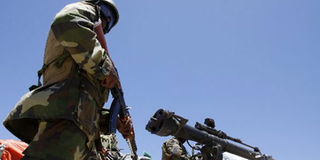US Army sending troops to Kenya

Amisom soldiers in Karan district of Mogadishu, Somalia on February 17, 2012. Photo/FILE
Units from a US Army brigade will soon begin training Kenyan troops as part of a major expansion of American military capabilities throughout Africa.
Plans call for teams of trainers from the Army's 2nd Brigade, known as the "Dagger Brigade," to be deployed to as many as 35 countries in Africa beginning in the next couple of months, according to the Associated Press.
The team heading to Kenya will likely consist of fewer than 200 US troops.
And the US Army units being dispatched to Africa will not be permitted to conduct combat operations without specific approval from the Pentagon.
But the US Africa Command (Africom) has recently added a rapid-response force capable of direct military interventions by American troops.
Africom head Gen Carter Ham revealed the establishment of the "Commander's in-Extremis Force" during a talk earlier this month at a university in Washington DC.
Intensified US military attention to Africa reflects concerns about Islamist armed groups in Somalia, Mali, Nigeria and Libya.
Gen Ham said recently that his biggest worry is collaboration among these various groups, which, he declared, “poses the greatest threat to regional stability more broadly across Africa, into Europe and the United States as well.”
Africom, which maintains its headquarters in Germany, has sought since its formation five years ago to assuage fears in Africa about growing militarisation of US policy toward the continent.
Gen Ham and other officials have said the US does not plan to establish military bases in Africa and acts in response to requests from African governments.
But the US military role in Africa, including Kenya, continues to expand.
About 120 US military personnel are stationed at Manda Bay, the Washington Post reported earlier this year.
The newspaper noted that US Navy engineering unit had been assigned to complete a $10 million runway upgrade at the naval and air base on Kenya's coast.
The US also assigns more than 2,000 troops to a base in Djibouti. The American forces there carry out air and sea patrols all over the Horn.
Drone flights are conducted from the Djibouti base as well as from US installations in Ethiopia and the Seychelles.
About 100 US special forces personnel are already conducting military training in a number of countries, Gen Ham says.
In addition, 100 US combat advisors were dispatched to four African states early this year to help hunt down Joseph Kony, leader of the Lord's Resistance Army.
Africom conducted its first direct military operation last year in Libya where it helped coordinate the Nato bombing campaign that contributed to the fall of dictator Muammar Gaddafi.
The growing US military presence in Africa has prompted critical responses in the United States.
Horace Campbell, a professor of African American studies at a university in New York, wrote recently that Africom has undermined the authority of regional organisations such as the East African Community and the Djibouti-based Intergovernmental Authority on Development.
"Africom as a formal vehicle of US imperialism is a disaster," Prof Campbell declared.




